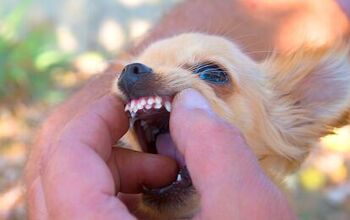What Is Giardia In Dogs?

We all enjoy watching our dogs run at the local off-leash park, explore a woodland trail or just romp in their own backyard; however free-ranging can incur an unexpected – and unwelcome – outcome in the form of giardia. Giardia or giardiasis is an intestinal infection brought on by ingesting parasites found in the feces of other animals or from drinking contaminated standing water. While it can occur in both dogs and cats, it’s most common in dogs and is considered “zoonotic” meaning it can be passed between animals and humans. That said, pet owners need not worry – while multi-pet households can be at risk of more than one animal becoming infected, the chance of you being similarly affected is quite small. The human strain is different from that of the animal strain and you will typically see it referred to as “Travelers Diarrhea”, a malady more likely to be picked up from drinking contaminated water at vacation hot-spots than from cuddling with Fido.
Related: My Dog Has Diarrhea – How Do I Treat It?
What Causes Giardia in Dogs?
Simply put, dog can contract giardia by consuming – or even just sniffing out – infectious cysts that are either shed in another animal’s feces or are living in a contaminated water source. Once ingested, the cysts open and active forms of giardia attach to the walls of the intestine before reproducing. Eventually they build new cysts around themselves and pass from the pet’s body via feces to begin the cycle again.
Symptoms and Types
Symptoms are more evident in younger dogs than in older pooches and can be either sudden (acute), temporary (transient), non-continuous (intermittent), or ongoing (chronic) in nature. The most common symptom is diarrhea and if left untreated, serious GI inflammation, mal-absorption and other digestive issues, along with weight loss can occur.
Related: Dog Scooting: The Sad, Scratchy Story Of Oscar’s Ichy Butt
It is important to note that not all infected dogs display such obvious signs of tummy troubles. Pet parents should be cognizant of sudden lethargy, vomiting or weight loss in their dog and get him in for a good once-over by your vet.
Treatment of Giardia in Dogs
Your vet will want to rule out other potential causes prior to recommending treatment options, however the therapy for giardia in dogs is typically performed on an outpatient basis and the prognosis is good.
The most common drug used to kill the cyst is the antibiotic metronidazole, which is administered for five to seven days. Another anti-parasitic drug, fenbendazole may also be used in conjunction with metronidazole and other drugs may be required as supplemental therapy if dehydration or severe diarrhea is present.
To be completely effective, treatment does require thorough follow-up to insure the parasite has been completely cleared from your pet’s body.
And it’s important that once your pet has been treated for giardia that you thoroughly wash down and disinfect their bed and sleeping area, allowing it to dry completely before giving your pet access. Because the cysts cannot thrive in a dry environment, care should always be taken to avoid allowing your pet’s bedding/habitat to remain wet or damp for extended periods of time.
Mary Simpson is a writer and communications professional from Port Credit, Ontario. A soft touch for anything stray, she shares her century home with an eclectic collection of rescues that include orange tabby Chico, tuxedo Simon, and jet black Owen. She enjoys running, politics, exploring the wine regions of Niagara and is an avid supporter of the “shop local” movement.

Sharing space with three seriously judgy Schnoodles and a feline who prefers to be left alone. #LivingMyBestLife
More by Mary Simpson
























